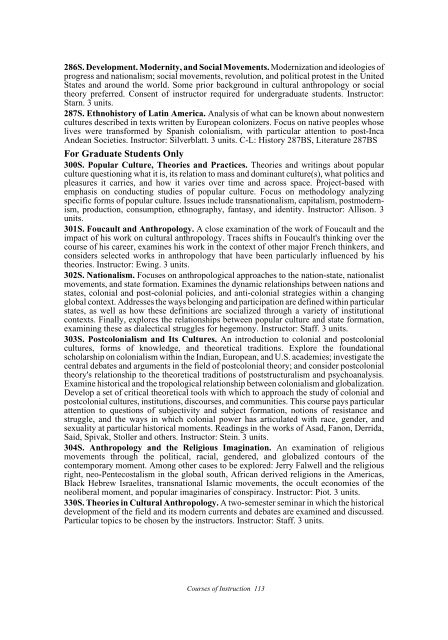Duke University 2008-2009 - Office of the Registrar - Duke University
Duke University 2008-2009 - Office of the Registrar - Duke University
Duke University 2008-2009 - Office of the Registrar - Duke University
Create successful ePaper yourself
Turn your PDF publications into a flip-book with our unique Google optimized e-Paper software.
286S. Development. Modernity, and Social Movements. Modernization and ideologies <strong>of</strong><br />
progress and nationalism; social movements, revolution, and political protest in <strong>the</strong> United<br />
States and around <strong>the</strong> world. Some prior background in cultural anthropology or social<br />
<strong>the</strong>ory preferred. Consent <strong>of</strong> instructor required for undergraduate students. Instructor:<br />
Starn. 3 units.<br />
287S. Ethnohistory <strong>of</strong> Latin America. Analysis <strong>of</strong> what can be known about nonwestern<br />
cultures described in texts written by European colonizers. Focus on native peoples whose<br />
lives were transformed by Spanish colonialism, with particular attention to post-Inca<br />
Andean Societies. Instructor: Silverblatt. 3 units. C-L: History 287BS, Literature 287BS<br />
For Graduate Students Only<br />
300S. Popular Culture, Theories and Practices. Theories and writings about popular<br />
culture questioning what it is, its relation to mass and dominant culture(s), what politics and<br />
pleasures it carries, and how it varies over time and across space. Project-based with<br />
emphasis on conducting studies <strong>of</strong> popular culture. Focus on methodology analyzing<br />
specific forms <strong>of</strong> popular culture. Issues include transnationalism, capitalism, postmodernism,<br />
production, consumption, ethnography, fantasy, and identity. Instructor: Allison. 3<br />
units.<br />
301S. Foucault and Anthropology. A close examination <strong>of</strong> <strong>the</strong> work <strong>of</strong> Foucault and <strong>the</strong><br />
impact <strong>of</strong> his work on cultural anthropology. Traces shifts in Foucault's thinking over <strong>the</strong><br />
course <strong>of</strong> his career, examines his work in <strong>the</strong> context <strong>of</strong> o<strong>the</strong>r major French thinkers, and<br />
considers selected works in anthropology that have been particularly influenced by his<br />
<strong>the</strong>ories. Instructor: Ewing. 3 units.<br />
302S. Nationalism. Focuses on anthropological approaches to <strong>the</strong> nation-state, nationalist<br />
movements, and state formation. Examines <strong>the</strong> dynamic relationships between nations and<br />
states, colonial and post-colonial policies, and anti-colonial strategies within a changing<br />
global context. Addresses <strong>the</strong> ways belonging and participation are defined within particular<br />
states, as well as how <strong>the</strong>se definitions are socialized through a variety <strong>of</strong> institutional<br />
contexts. Finally, explores <strong>the</strong> relationships between popular culture and state formation,<br />
examining <strong>the</strong>se as dialectical struggles for hegemony. Instructor: Staff. 3 units.<br />
303S. Postcolonialism and Its Cultures. An introduction to colonial and postcolonial<br />
cultures, forms <strong>of</strong> knowledge, and <strong>the</strong>oretical traditions. Explore <strong>the</strong> foundational<br />
scholarship on colonialism within <strong>the</strong> Indian, European, and U.S. academies; investigate <strong>the</strong><br />
central debates and arguments in <strong>the</strong> field <strong>of</strong> postcolonial <strong>the</strong>ory; and consider postcolonial<br />
<strong>the</strong>ory's relationship to <strong>the</strong> <strong>the</strong>oretical traditions <strong>of</strong> poststructuralism and psychoanalysis.<br />
Examine historical and <strong>the</strong> tropological relationship between colonialism and globalization.<br />
Develop a set <strong>of</strong> critical <strong>the</strong>oretical tools with which to approach <strong>the</strong> study <strong>of</strong> colonial and<br />
postcolonial cultures, institutions, discourses, and communities. This course pays particular<br />
attention to questions <strong>of</strong> subjectivity and subject formation, notions <strong>of</strong> resistance and<br />
struggle, and <strong>the</strong> ways in which colonial power has articulated with race, gender, and<br />
sexuality at particular historical moments. Readings in <strong>the</strong> works <strong>of</strong> Asad, Fanon, Derrida,<br />
Said, Spivak, Stoller and o<strong>the</strong>rs. Instructor: Stein. 3 units.<br />
304S. Anthropology and <strong>the</strong> Religious Imagination. An examination <strong>of</strong> religious<br />
movements through <strong>the</strong> political, racial, gendered, and globalized contours <strong>of</strong> <strong>the</strong><br />
contemporary moment. Among o<strong>the</strong>r cases to be explored: Jerry Falwell and <strong>the</strong> religious<br />
right, neo-Pentecostalism in <strong>the</strong> global south, African derived religions in <strong>the</strong> Americas,<br />
Black Hebrew Israelites, transnational Islamic movements, <strong>the</strong> occult economies <strong>of</strong> <strong>the</strong><br />
neoliberal moment, and popular imaginaries <strong>of</strong> conspiracy. Instructor: Piot. 3 units.<br />
330S. Theories in Cultural Anthropology. A two-semester seminar in which <strong>the</strong> historical<br />
development <strong>of</strong> <strong>the</strong> field and its modern currents and debates are examined and discussed.<br />
Particular topics to be chosen by <strong>the</strong> instructors. Instructor: Staff. 3 units.<br />
Courses <strong>of</strong> Instruction 113









